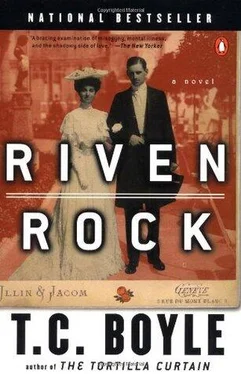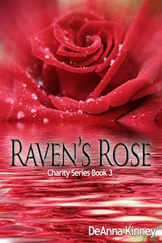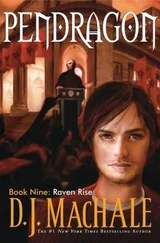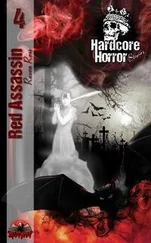T. Boyle - Riven Rock
Здесь есть возможность читать онлайн «T. Boyle - Riven Rock» весь текст электронной книги совершенно бесплатно (целиком полную версию без сокращений). В некоторых случаях можно слушать аудио, скачать через торрент в формате fb2 и присутствует краткое содержание. Год выпуска: 1999, Издательство: Penguin Books, Жанр: Современная проза, на английском языке. Описание произведения, (предисловие) а так же отзывы посетителей доступны на портале библиотеки ЛибКат.
- Название:Riven Rock
- Автор:
- Издательство:Penguin Books
- Жанр:
- Год:1999
- ISBN:нет данных
- Рейтинг книги:5 / 5. Голосов: 1
-
Избранное:Добавить в избранное
- Отзывы:
-
Ваша оценка:
- 100
- 1
- 2
- 3
- 4
- 5
Riven Rock: краткое содержание, описание и аннотация
Предлагаем к чтению аннотацию, описание, краткое содержание или предисловие (зависит от того, что написал сам автор книги «Riven Rock»). Если вы не нашли необходимую информацию о книге — напишите в комментариях, мы постараемся отыскать её.
Riven Rock — читать онлайн бесплатно полную книгу (весь текст) целиком
Ниже представлен текст книги, разбитый по страницам. Система сохранения места последней прочитанной страницы, позволяет с удобством читать онлайн бесплатно книгу «Riven Rock», без необходимости каждый раз заново искать на чём Вы остановились. Поставьте закладку, и сможете в любой момент перейти на страницу, на которой закончили чтение.
Интервал:
Закладка:
Outwardly, he showed nothing, but you could see he was grieving, as he had for Dr. Hoch, and O‘Kane kept waiting for some sort of manic episode, especially when the news of Mr. Harold McCormick’s divorce broke. The first O’Kane heard of it was when he came into work one morning and all Mr. McCormick could talk about was the subject of divorce — divorce in all its legal, historical and anthropological ramifications, how so-and-so had divorced his wife of thirty years and what King Henry the Eighth had done and how the Trobriand Islanders would kill and eat their wives on divorcing them and offer the choicest morsels to their in-laws, if savages could be said to have in-laws, and how did he, Eddie, feel about the subject? He’d been divorced, hadn’t he? From what-was-her-name, Rosaleen?
O‘Kane had to admit that he hadn’t.
That stopped Mr. McCormick cold. They were outside at the time-they’d just come back from hurtling aimlessly round the property at a pace that varied from a jog to a sprint — and Mr. McCormick blinked at him in incredulity. “You mean you — all these years — and she, she — all by herself? Or maybe, maybe even with, with other men?”
Mart, still heaving for breath, was looking on. They were at the front door and Butters was there, his nose in the air, holding the door stiffly open for them. “I, uh, I guess I never told you — remember when she had to leave to go back and nurse her mother? And her brother, the one that had brain cancer?”
Mr. McCormick gave him a blank look. He probably didn’t recall much from those days. In fact, O‘Kane was amazed that he’d remembered Rosaleen’s name.
“Well,” O‘Kane said, painting the picture with his hands, “sad to say but she caught the brain cancer from him and died. So I’m a widower, really. A widower — that’s what I am.”
Mr. McCormick seemed satisfied with the explanation, but when they got back upstairs and settled into the parlor, he became agitated all over again. “Here,” he said, “here, look at this,” and he thrust a pile of newspaper clippings into O‘Kane’s lap, clippings that hadn’t actually been clipped, since he wasn’t allowed access to scissors, but which he’d painstakingly creased and torn out of the papers.
The first headline read HARVESTER PRES TO DIVORCE ROCKE- FELLERHEIR, and there were half a dozen more of that ilk. It seemed that Harold, who was now president of International Harvester since Cyrus Jr. had retired, was divorcing Edith, to whom he’d been married for twenty-six years. She’d spent the last eight years in Switzerland as a devotee and disciple of Karl Jung and his school of psychoanalysis, and Harold, who was the playboy of the family, fond of fancy clothes, expensive cars, airplanes and women, had fallen for the Polish diva, Ganna Walska. A dark and fleshy beauty, Madame Walska was once widowed and twice divorced at thirty, and she was twenty years Harold’s junior. And she couldn’t sing, not a note — or not enough to keep people from stampeding for the exits, anyway.
After O‘Kane had read through the articles and handed them to Mart for his perusal, he looked up into Mr. McCormick’s expectant face and shrugged. “It happens sometimes, Mr. McCormick,” he said, “you know that. It’s nothing to get excited about.”
“No, no,” he said, rapid-fire, and the floor turned to magma suddenly and he had to hop from foot to foot, “no, no, you don‘t, don’t understand. He’s the president, he’s the president, and he could, I could — Katherine. I could divorce Katherine.”
The idea remained fixed in Mr. McCormick’s brain for some time, and when he wasn’t debating its finer points in a high ragged voice, he was brooding over it in a chasm of silence. If Harold could divorce, then so could he. But if he got divorced, then he wouldn’t have Katherine, and if he didn’t have Katherine who would be his wife and run his affairs for him? And he loved Katherine, didn’t he? Even if she was running around with other men and that Mrs. Roessing? On and on it went, round and round, like a dog chasing its tail.
Meanwhile, Harold’s situation only got worse. Because after his divorce was granted and Edith got custody of the children and the better part of their joint property, including their Lake Forest mansion, the Villa Turicum, which she would convert into a “Mecca for devotees of psychoanalysis,” Ganna Walska turned around and married an American millionaire by the name of Alexander Smith Cochran. Harold was devastated and the press howled with delight. But then, a year later, Madame Walska jettisoned Alexander Smith Cochran and married Harold, but only on condition that he finance her operatic tour of America, replete with the finest choruses, orchestras, costumes and staging money could buy. Again the press howled in derision and howled so vociferously and at such length that Harold was forced to step down as president of the Harvester Company in the wake of the scandal.
All this Mr. McCormick seemed to absorb with a growing sense of despair and gloom till the day came when he wouldn’t get out of bed. O‘Kane arrived to find Dr. Brush and Mart trying to reason with him. Wouldn’t he like to get up now and have a nice shower bath? No, he wouldn’t. Wouldn’t he like breakfast? No. A drive? A movie? A concert with Mr. Eldred? No, no and no. Well, and what seemed to be the problem? He wouldn’t say. But after Dr. Brush and Mart had gone out in the hallway to consult, Mr. McCormick reached into the breast pocket of his blue silk pajamas and handed O’Kane a newspaper clipping folded so rigorously and so repeatedly it had been reduced to the size of a matchbook. “Go ahead,” he said. “G-go ahead, Eddie — read it. Out loud.”
O‘Kane unfolded the pellet of newsprint, smoothed out the wrinkles on the table, and began to read:
EX-HARVESTER PRES TO HAVE MONKEY GLAND TRANSPLANT
Mr. Harold McCormick, former president of International Harvester, whose sudden marriage last year to the Polish chanteuse, Madame Ganna Walska, rocked the company and scandalized the nation, has gone into hospital in Chicago for urologic surgery. His surgeon, Dr. V P. Lespinasse, known as “the dean of gland transplantation,” is said to be experimenting with the use of monkey glands to improve Mr. McCormick’s chances of fathering children with his young wife. Madame Walska had no comment, except to say that her husband was “insatiable in his search for the realization of the physical demands of marriage — insatiable because they were unattainable for him anymore.”
When he looked up, Mr. McCormick was wearing the strangest expression on his face, as if he’d just pulled himself up onto solid ice only to have it give way and plunge him back into the dark chilling waters all over again. “Monkeys,” he said bitterly, “why does it always have to be monkeys?”
And then there was the earthquake.
It struck just before seven on June 29, 1925, and it flipped O‘Kane up into the air above his bed, where he’d been sleeping off the effects of several boilermakers and a woman whose name he couldn’t remember, turned him over and dropped him back down again as neatly as an omelet flipped in a pan. Everything in his field of vision was alive, just like in his hallucinations the last time he’d given up drinking, but this was no hallucination. The painting over the bed came down on him, impaling one of the gamboling kittens on the bedpost, the wardrobe skittered across the room and toppled with a crash, plaster rained down, and still everything shook and danced and jittered as if the floor was electrified. It was exactly like being on a train coming into the station and the engineer hauling too hard on the brakes.
After pulling on his pants and shoes, O‘Kane rushed headlong into the hall, where dust infested the air and the banister on the landing had given way in a conspiracy of splintered wood. Below, in Mrs. Fitzmaurice’s immaculate parlor, a welter of bricks and lath lay scattered over the carpet, and he could see where the building next door had poked its elbow through the wall. Like the hero he was, O’Kane assisted all the ladies out into the street and then spent the next ten hours running from one place to another, rescuing a child here, battling flames there, mad with the adrenal rush of it, soot-blackened and bleeding and hatless and shirtless, galvanized in the moment.
Читать дальшеИнтервал:
Закладка:
Похожие книги на «Riven Rock»
Представляем Вашему вниманию похожие книги на «Riven Rock» списком для выбора. Мы отобрали схожую по названию и смыслу литературу в надежде предоставить читателям больше вариантов отыскать новые, интересные, ещё непрочитанные произведения.
Обсуждение, отзывы о книге «Riven Rock» и просто собственные мнения читателей. Оставьте ваши комментарии, напишите, что Вы думаете о произведении, его смысле или главных героях. Укажите что конкретно понравилось, а что нет, и почему Вы так считаете.












